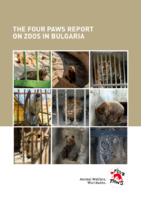Confined in tiny cages, with hardly any exercise, little to no enrichment, poor professional care, and no opportunities to retreat, these animals suffer enormously. Some of these animals are the result of uncontrolled breeding and even inbreeding, resulting in serious health issues. Despite these abuses and irregularities, the Bulgarian Ministry of Environment and Water has been legalising inappropriate wild animal facilities by granting them a zoo permit. This has been done without ensuring that they meet husbandry, conservation and education standards regulated by the EU Zoo Directive. Even the facilities which remain illegal have been allowed to continue to keep and breed wild animals.
FOUR PAWS appealed to the Bulgarian institutions to stop legalising the inappropriate keeping of wild animals in zoos. With success: The topic has been put on the political agenda, and Bulgarian zoos can apply now for EU funding to improve their infrastructure and wild animal husbandry standards. FOUR PAWS will continue to monitor the situation and stand up for a #ChangeForZooAnimals in Bulgaria!

The FOUR PAWS report on zoos in Bulgaria
There are 21 zoos in Bulgaria, distributed throughout the country. Almost all (19) of them are publicly owned and managed by local municipalities. Seventeen of these zoos are open to visitors, including the Kyustendil Zoo, although it has had its license revoked since 2011.






























